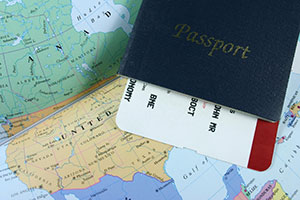One of the many perks of obtaining your CPA license is not only job security, but actually being in high demand. And not just in the United States, but all over the globe. As U.S. businesses expand overseas or as overseas businesses are expanding themselves, the demand for CPAs continues to grow as clients turn to international markets. Such global mobility gives you the opportunity to live and work abroad for anywhere between a few weeks to a few years, broadening your professional expertise as well as inputting your own and gaining new perspective as you work in a different country, culture, and lifestyle.
FAQs about working abroad
According to the Journal of Accountancy’s “How to Land an Overseas Assignment”, U.S. CPAs can gain international experience even if they don’t work for a Big Four. After seeking tips from three experts on how U.S. CPAs can land a job abroad, we’ve summarized what they found out that can help you land a position overseas as well as some frequently asked questions about the topic in general.
How difficult is it to gain international experience as a U.S. CPA if you don’t work for the Big Four?
Not as difficult as it used to be since the middle-market companies are now expanding into growth markets like China, India, Brazil, and many other places around the globe. Grant Thornton sends lots of people overseas from all service lines as well as other large multinational companies. Now, it’s a matter of finding the right company and the right opportunity at the right time. This can happen at any stage of your career.
In addition, demand for U.S. CPAs from U.S. clients’ international divisions and subsidiaries, specifically in areas of compliance, tax, and regulatory reporting, is growing.
Do U.S. CPAs have unique skills that make them attractive overseas?
Yes. U.S. CPAs have a broader background in financial skills; they no longer just crunch numbers, but do more general management and business partnering. Pair that with the project-management experience you get out of a U.S. public accounting firm, and you’ve got some of the top skills that make you especially desirable overseas as employers around the world highly value those types of abilities.
Additionally, forensics and investigative services is growing in demand for firms in Brazil, Russia, India, and China, as well as other markets where there’s a lot of corruption.
What do employers look for on a resume when considering hiring a CPA to work abroad?
When it comes to what employers are looking for, it can be a variety of equally significant things, such as experience with:
- Working for a public company listed in the U.S.
- U.S. GAAP, PCAOB, and SEC rules as well as the Foreign Corrupt Practices Act
- Internal audit
- Significant understanding of the industry
- IFRS, tax, government risk, and compliance
- Certifications such as CPA, CGMA, or CA
- Basel III (if you’re in the banking world), the worldwide regulatory discipline within financial services
- Openness and cultural awareness; whether or not you’re able to adapt, show a willingness to travel, and curiosity about other cultures
How important is it to speak the local language or speak a second language?
While it would be nice to have a second language skill, specifically aimed toward the country you’re going to, it’s absolutely not necessary. And it’s definitely not as important as having the management or technical experience of a U.S. CPA. But if you’re concerned about language barriers, consider some English-speaking countries like India where many people speak English. But generally, the business language of English is global.
Are some countries more suited for a U.S. CPA seeking work overseas than others?
There seems to be more demand in South America, Asia, and Western Europe inclusive of the U.K. If we look at the Middle East, construction and health care are growing, and so there’s a demand for CPAs with construction and health care backgrounds.
Is the interview process different for overseas jobs?
It will probably be longer with more people involved, and they may ask you questions you aren’t quite expecting, but this is because they’re looking for a set of soft skills that aren’t apparent off the bat. Because it’s a huge investment, employers are looking to make sure that your personal situation and their business-care perspective are a good match and fit, just like any company.
But, it is still an interview, so that means come prepared as you would for any other interview. Review the company’s background, research their work, and in general, do your homework. Expect the unexpected, and be prepared for it!
Any advice for U.S. CPAs who want to work abroad?
If you’d like to be involved in international business but don’t have the experience in your current company, volunteer within your organization for project-related business that might give you that exposure.
Consider gaining language skills through an online course. Learn more on any new regulatory or compliance impacts within the country or particular region of the world you’re interested in.
Be patient and seek the right opportunity that works for your career path whether that’s early on or later. Sometimes even retired CPAs can offer lots of value, especially in developing countries where management and technical experience is needed.




